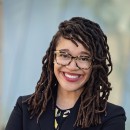Faculty News
Pages
 William Elliott Serves as Expert Witness on CSAs Before U.S. Senate Committee
William Elliott Serves as Expert Witness on CSAs Before U.S. Senate CommitteeProfessor William Elliot III provided testimony as an expert witness at the United States Senate Committee on Finance hearing on child savings accounts and other tax-advantaged accounts benefiting American children.
“Children’s asset investments are more than just financial benefits for higher education: they have demonstrated the potential to transform the opportunity landscape—and in the process, to reset young people’s confidence in U.S. institutions and their ability to deliver equitable returns,” said Elliott. “CSAs help create an environment for forming tangible hopes. What makes them tangible is that they give children a stake in the future—their own, and ours. They give them the power to purchase a piece of their future today.”
- May 22, 2024
- Learn more »
 Lisa Wexler Awarded Grant from the National Institute of Mental Health
Lisa Wexler Awarded Grant from the National Institute of Mental HealthProfessor Lisa Wexler was awarded an NIMH R01 grant for her project “Efficacy-Implementation Study for PC CARES in Rural Alaska” through the NIH Intervention Research to Improve Native American Health. The trial evaluates the impact of Promoting Community Conversations About Research to End Suicide (PC CARES) on adult participants and the adults and youth they are close to, and who could benefit from the intervention. This project contributes to the long-term goal of translating suicide prevention research into culturally responsive community practice to reduce suicide risk and promote youth well-being in Alaska Native communities.
“I am excited about our new project, which trains and supports local leaders in sharing suicide prevention best practices within their communities in order to spark community-led actions,” said Wexler. “We believe that the project builds a sustainable way to offer community members tools through PC CARES that they can use to promote positive community change that promotes mental wellness and reduces suicide risk.”
PhD student Lauren White will be leading a project aim. “The implementation aim on this grant is among the first NIH funded studies that use Implementation Science frameworks to assess the contextual determinants of implementation in a rural Tribal community. By studying how PC CARES is carried out with our partners, we will also build general knowledge of what Tribes and interventionists need to know about using newly developed evidence-based interventions to drive healthy change in Native communities,” said White.
- May 22, 2024
 Brooke Buys Named 2024 MSW Student Government Teacher of the Year
Brooke Buys Named 2024 MSW Student Government Teacher of the YearLecturer Brooke Buys was named the 2024 Student Union Teacher of the Year. This award is given by the School of Social Work student government and recognizes faculty who have demonstrated commitment to improving DEI, made an outstanding and positive contribution to the School’s climate, and whose skills, dedication, understanding and caring have made a positive impact on students.
- May 21, 2024
 Laura Yakas Receives 2024 Distinguished Lecturer Award
Laura Yakas Receives 2024 Distinguished Lecturer AwardLecturer Laura Yakas has received the 2024 Distinguished Lecturer Award. This highly esteemed peer award recognizes excellence in teaching and mentoring students and the very highest ideal of a School of Social Work lecturer.
- May 21, 2024
 Linda Chatters Receives 2024 Distinguished Faculty Award
Linda Chatters Receives 2024 Distinguished Faculty AwardProfessor Linda Chatters has received the 2023 Distinguished Faculty Award. This highly esteemed peer award recognizes governing faculty members who demonstrate excellence in domains including longevity of service to the School; national recognition in scholarship and service; excellence in teaching and mentoring; outstanding service to the School and the University; and contribution to the professional community.
Chatters is the Paula Allen-Meares Collegiate Professor of Social Work. In addition, she is Professor of Health Behavior and Health Education at the School of Public Health and a faculty associate at the ISR’s Research Center for Group Dynamics.
- May 21, 2024
 Odessa Gonzalez Benson Receives 2024 Doctoral Student Organization Faculty Award
Odessa Gonzalez Benson Receives 2024 Doctoral Student Organization Faculty AwardAssistant Professor Odessa Gonzalez Benson has received the 2024 Doctoral Student Organization Faculty Award. The Doctoral Student Organization bestows this award to a faculty mentor who has demonstrated exceptional commitment to mentoring, developing and supporting doctoral students.
- May 21, 2024
 Daphne Watkins Receives Research Grant from the National Heart, Lung, and Blood Institute
Daphne Watkins Receives Research Grant from the National Heart, Lung, and Blood InstituteProfessor Daphne Watkins is the principal investigator in a new R01 research grant from the National Heart, Lung, and Blood Institute titled “Addressing Structural Racism in Heart Failure Care and Outcomes: A Mixed Methods Evaluation of The Social Structure of Care Delivery.” The goal of the project is to develop a comprehensive understanding of structural barriers as well as facilitators for equitable care and outcomes, and to develop a best practices toolkit to address structural racism and discrimination in heart failure care.
"Addressing racism and discrimination at the structural level is essential if we want to move toward health equity in heart failure care and outcomes,” said Watkins. “I am excited to be a part of such a dynamic team of researchers and clinicians who want to understand and improve heart failure delivery networks within the social structure of care delivery. In the long term, our goal is to advance equitable care and outcomes for patients.”
- May 21, 2024
 Shanna Kattari’s Book Receives AAECT 2024 Book Award
Shanna Kattari’s Book Receives AAECT 2024 Book AwardAssociate Professor Shanna Kattari’s book “Exploring Sexuality and Disability: A Guide for Human Service Professionals,” has received the American Association of Sexuality Educators, Counselors and Therapists 2024 Book Award (Sexuality Professional Focus).
Chapter editors include Lecturers Jax Kynn, Erin Martinez and Laura Yakas; and PhD students E.B. Gross, Nicolas Juarez and Kari Sherwood.
- May 14, 2024
- Learn more »
 Ashley Cureton Receives 2024 Lester Monts Award
Ashley Cureton Receives 2024 Lester Monts AwardAssistant Professor Ashley Cureton has received the 2024 Lester Monts Award from the U-M Center for Educational Outreach. The Lester Monts Award is a distinguished honor for faculty and staff who have collaborated with our team and contributed exceptionally to advancing educational outreach on campus and beyond. Cureton was selected for her inspiring commitment to initiatives including the Michigan Pre-College and Youth Conference, and Raise Scholars; the development of new collaborations with school partners; and her service and significant contributions in the field of social work.
- May 14, 2024
 Daicia Price Quoted in Crain’s Detroit About Police Department Mental Health Units
Daicia Price Quoted in Crain’s Detroit About Police Department Mental Health UnitsClinical Associate Professor Daicia Price is quoted in a Crain’s Detroit article on the challenges in creating specialized units to respond to mental health emergency calls. The Detroit Police Department, which created a mental health unit at the end of 2022, received over 16,000 calls last year that involved someone in mental distress — or more than 43 calls per day. That unit has grown to 22 officers, three sergeants, a lieutenant and six behavioral health specialists. But finding social workers and psychologist to work in these units is a challenge. Michigan is facing a shortage of mental health professonals and, as Price noted, these community programs simply can’t compete with private practice.
“We were providing training to co-responders, and they went out in the field and found out it wasn’t suitable,” Price said. “They can go into private practice or the private sector and make $30,000 more with half the responsibilities. How do we train behavioral health individuals to be in these settings and make sure they deliver that public service and compensated the way they should when they can sit in an office with people with milder disorders and make more money?”
- May 14, 2024
- Learn more »